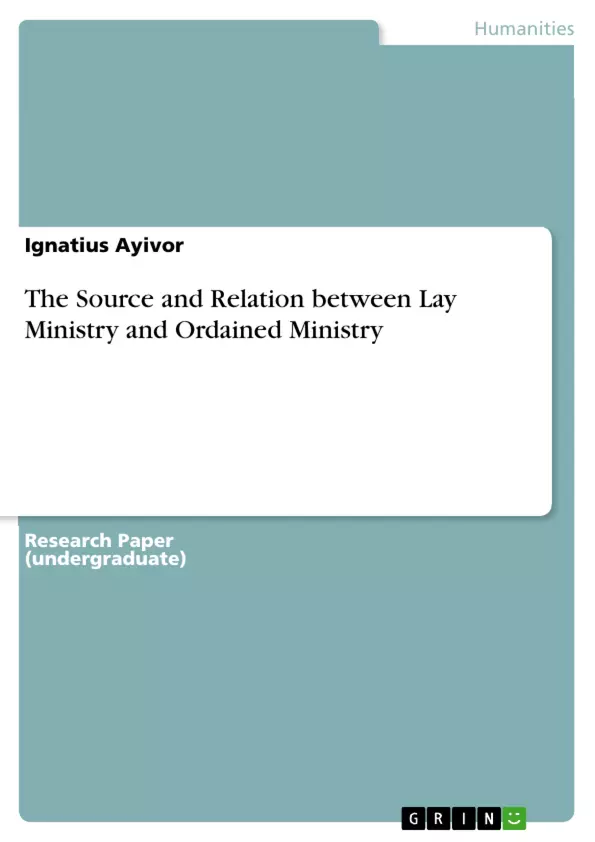On the basis of the fact that lay people are included in the People of God and that all Christ’s faithful are called to share in the life and mission of Christ, the laity does really have mission to undertake in the Church. The Decree on the Apostolate of the Laity seeks to unfold the ministry of the laity in the Church’s mission in a clearer way. According to this decree there is a common call to all Christ’s faithful in the building up of the Body of Christ, the Church. There is a diversity of ministries and the lay faithful have their mission to perform within the ecclesial structures.
Every member of the Church whether he or she is cleric or lay is called to mutual and collaborative ministry. The diversity of ministries in the Church is a witness to the unity of all members in the Church.
Though the duties, activities and rights of the laity underwent many considerable changes during the course of the history of the Church, the fact remains that the lay faithful have their ministry in the Church. The mission of the Church is the concern of all the members of the Church, clerics and lay persons alike. However, all the Christfideles do not perform the mission of the Church in the same way; they undertake ministries in the Church, each according to his condition or gift(s) received from God himself.
Table of Contents
- A. Introduction
- The Source of Ministry in the Church
- Tria Munera
- Prophetic Office
- Priestly Office
- Kingly Office
- C. Secular Character of Lay Ministry
- Common Priesthood and Ministerial Priesthood
- Common Priesthood
- Ministerial Priesthood
- Towards Theology of Lay Ministry
- Common Priesthood and Ministerial Priesthood
Objectives and Key Themes
This text explores the concept of lay ministry within the Catholic Church, examining its historical development, theological foundations, and contemporary significance. The text aims to clarify the nature of lay ministry, demonstrating how it arises from the shared participation of all Christians in the mission of Christ.
- The source of ministry in the Church: The text explores the Christological foundations of ministry, emphasizing that Jesus Christ is the ultimate source of all ministry within the Church.
- Tria Munera: The text examines the three-fold office of Christ (prophet, priest, and king), exploring how these offices manifest within the Church and relate to lay ministry.
- Secular Character of Lay Ministry: The text highlights the importance of lay ministry in the secular sphere, demonstrating how lay people participate in the mission of the Church through their everyday lives.
- Common Priesthood and Ministerial Priesthood: The text distinguishes between the common priesthood of all baptized Christians and the ministerial priesthood of ordained clergy, showing how both are essential for the Church's mission.
- Towards a Theology of Lay Ministry: The text aims to contribute to a deeper understanding of lay ministry, providing a theological framework for its practice and development within the Church.
Chapter Summaries
The introduction of the text establishes the foundation for understanding lay ministry by first exploring the source of ministry in the Church itself. This section emphasizes the Christological grounding of the Church's mission, highlighting the unique role of Jesus Christ as the source of all ministry. The text then delves into the concept of "tria munera," examining the three-fold office of Christ as prophet, priest, and king. This discussion explores the historical development of this concept, highlighting its significance in understanding the mission of Christ and its implications for the Church. The chapter concludes with a brief exploration of how these ideas relate to the evolving understanding of lay ministry within the Church.
The chapter on the secular character of lay ministry focuses on the active participation of lay people in the Church's mission. It begins by clarifying the distinction between common priesthood and ministerial priesthood, emphasizing that all baptized Christians share in the common priesthood, while ordained clergy hold the ministerial priesthood. This chapter demonstrates how lay people, through their everyday lives and vocations, participate in the Church's mission and contribute to the building up of the Body of Christ. It also explores the evolving understanding of lay ministry within the Church, acknowledging the significant changes that have occurred throughout history.
Keywords
This text delves into the core concepts of lay ministry, exploring its theological foundations, historical development, and contemporary significance within the Catholic Church. Key terms and concepts include: lay ministry, tria munera, common priesthood, ministerial priesthood, secular character of lay ministry, Church mission, Christological foundation, and the theological framework of lay ministry.
Frequently Asked Questions
What is the source of ministry in the Catholic Church?
Jesus Christ is the ultimate source of all ministry, and all faithful share in His mission through their baptism.
What are the "Tria Munera"?
They refer to the three-fold office of Christ: Prophet (teaching), Priest (sanctifying), and King (governing), in which the laity also participates.
How does lay ministry differ from ordained ministry?
While ordained ministry is a specific service through Holy Orders, lay ministry is characterized by its secular nature—engaging with the world to build up the Church.
What did the "Decree on the Apostolate of the Laity" clarify?
It unfolded the role of the laity in the Church's mission, emphasizing that every member is called to mutual and collaborative ministry.
Is the mission of the Church only the concern of clerics?
No, the mission is the concern of all members—clerics and lay persons alike—each according to their specific gifts and condition.
- Arbeit zitieren
- Ignatius Ayivor (Autor:in), 2017, The Source and Relation between Lay Ministry and Ordained Ministry, München, GRIN Verlag, https://www.grin.com/document/383644



